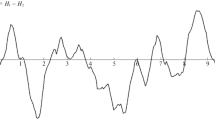Abstract
We address the problem of finding conditions which guarantee the existence of open-loop Nash equilibria in discrete time dynamic games (DTDGs). A classical approach to DTDGs involves analyzing the problem using optimal control theory. Sufficient conditions for the existence of open-loop Nash equilibria obtained from this approach are mainly limited to linear-quadratic games (Başar and Olsder in Dynamic noncooperative game theory, 2nd edn, SIAM, Philadelphia, 1999). Another approach of analysis is to substitute the dynamics and transform the game into a static game. But the substitution of state dynamics makes the objective functions of the resulting static problems extremely hard to analyze. We introduce a third approach in which the dynamics are not substituted, but retained as constraints in the optimization problem of each player, resulting thereby in a generalized Nash game. Using this, we give sufficient conditions for the existence of open-loop Nash equilibria for a class of DTDGs where the cost functions of players admit a quasi-potential function. Our results apply with nonlinear dynamics and without stage additive cost functions, and allow constraints on state and actions spaces, and in some cases, yield a generalization of similar results from linear-quadratic games.
Similar content being viewed by others
Notes
TPG\(_i\) denotes player i’s problem in the transboundary pollution game in the generalized Nash game formulation.
References
Aashtiani HZ, Magnanti TL (1981) Equilibria on a congested transportation network. SIAM J Algebraic Discrete 2(3):213–226
Başar T (2007) Control and game-theoretic tools for communication networks. Appl Comput Math 6(2):104–125
Başar T, Olsder GJ (1999) Dynamic noncooperative game theory, 2nd edn. SIAM, Philadelphia
Battigalli P, Cerreia-Vioglio S, Maccheroni F, Marinacci M (2015) Self-confirming equilibrium and model uncertainty. Am Econ Rev 105(2):646–677
Beck A (2014) Introduction to nonlinear optimization: theory, algorithms, and applications with MATLAB. SIAM, Philadelphia
Engwerda J (2005) LQ dynamic optimization and differential games. Wiley, New York
Facchinei F, Kanzow C (2007) Generalized Nash equilibrium problems. 4OR Q J Oper Res 5(3):173–210
Fershtman C, Kamien MI (1985) Conjectural equilibrium and strategy spaces in differential games. Optim Control Theory Econ Anal 2:569–579
Figuières C, Jean-Marie A, Quérou N, Tidball M et al (2004) Theory of conjectural variations. World Scientific, Singapore
Jank G, Abou-Kandil H (2003) Existence and uniqueness of open-loop Nash equilibria in linear-quadratic discrete time games. IEEE Trans Autom Control 48(2):267–271
Kannan A, Zavala VM (2011) A game-theoretical model predictive control framework for electricity markets. In: 49th Annual Allerton conference on communication, control, and computing. IEEE, pp 1280–1285
Kulkarni AA, Shanbhag UV (2012) On the variational equilibrium as a refinement of the generalized Nash equilibrium. Automatica 48(1):45–55
Kulkarni AA, Shanbhag UV (2015) An existence result for hierarchical Stackelberg v/s Stackelberg games. IEEE Trans Autom Control 60(12):3379–3384
Monderer D, Shapley LS (1996) Potential games. Games Econ Behav 14(1):124–143
Reddy PV, Zaccour G (2015) Open loop Nash equilibria in a class of linear quadratic difference games with constraints. IEEE Trans Autom Control PP(99)
Rosen JB (1965) Existence and uniqueness of equilibrium points for concave \({N}\)-person games. Econometrica 33(3):520–534
Van Long N (2010) A survey of dynamic games in economics, vol 1. World Scientific, Singapore
Wiszniewska-Matyszkiel A (2016) Belief distorted Nash equilibria: introduction of a new kind of equilibrium in dynamic games with distorted information. Ann Oper Res 243(1–2):147–177
Wiszniewska-Matyszkiel A (2017) Redefinition of belief distorted Nash equilibria for the environment of dynamic games with probabilistic beliefs. J Optim Theory Appl 172(3):984–1007
Author information
Authors and Affiliations
Corresponding author
Rights and permissions
About this article
Cite this article
Abraham, M.P., Kulkarni, A.A. New results on the existence of open loop Nash equilibria in discrete time dynamic games via generalized Nash games. Math Meth Oper Res 89, 157–172 (2019). https://doi.org/10.1007/s00186-018-0644-2
Received:
Accepted:
Published:
Issue Date:
DOI: https://doi.org/10.1007/s00186-018-0644-2




